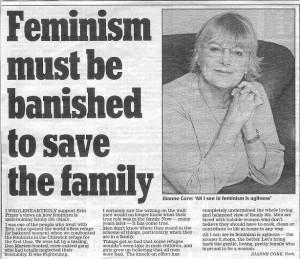There’s a piece making the rounds claiming that sleep training is a feminist issue. In a nutshell, the author argues that because women disproportionately handle night time care (and the associated sleeplessness), that we need to support sleep training (specifically extinction methods like cry-it-out and controlled crying) or we aren’t being our feminist selves. I disagree with this piece wholeheartedly for three main reasons which I’ll outline herein and I will even go a step further and say that sleep training is a feminist issue, but rather it’s the ending of these extinction methods that should be the focus of feminists, not endorsing them.
Reason #1: Oh… The Science
The author of this piece has to start with the (incorrect) notion that science overwhelmingly supports extinction sleep training and uses four main arguments to make her point:
First, that the Middlemiss study
Furthermore, the author suggests that the Middlemiss study is the only piece of evidence that we have when we speak out against extinction sleep training. That’s patently false. All I can do is recommend you read up on the influence of the development of self-soothing in relationship to sleep training, the individual differences in the experience of trauma, and the relationships between cortisol, crying, and responsiveness. I will acknowledge that we have few answers when it comes to sleep training, but there are good reasons many scientists do not believe extinction sleep training is the panacea we’ve been led to believe it is.
Second, she puts a lot of stock into the Slate article written a couple years ago which tries to argue in favour of sleep training. Now, beyond the obvious problem that it’s a Slate article and not academic research (after all, are we really going to Slate for our feminist and scientific discourse?), I have already addressed the glaring problems in this particular article here. No point repeating myself.
Third, she specifically states that the research by Anna Price and colleagues[2], which claimed to find no long-term differences between infants sleep trained and those not, is solid evidence of no harm. The problem? This research has been so thoroughly debunked that Pediatrics (where it was published) received several published responses (my own including) pointing out the various flaws in the research. I have written up the problems on EP here and my response on Pediatrics can be seen here. In short, the researchers’ methods were such that they can’t say much of anything. They basically split people up, gave one group an intervention, the other not. Half of the intervention group didn’t do the intervention and we don’t know how many in the control group actually did the intervention on their own. Then they compared them based on the initial random split, not by those who actually did or did not use extinction sleep training. If you don’t see the problem, science isn’t for you (and apparently it’s not for a lot of proponents of extinction sleep training).
Finally, she argues that our current generation, most of whom experienced extinction sleep training, is evidence of no harm. If it were so harmful, we’d have seen the effects, right? Exactly. I don’t know what adults she hangs out with, but I have heard far too many adults speak of their sleep issues, their memories of trauma of being left, and of feeling helpless and alone. Not all of them, but enough of them. Add to that rising rates of childhood depression and anxiety and lower rates of attachment between caregiver and child and I think it’s fair to say we’re on a pretty bad path.
Reason #2: That Logical Fallacy
The author of the original piece frames things as follows: Women are suffering from nighttime parenting and extinction sleep training methods can help them, thus if you don’t support extinction sleep training methods, you’re not being a good feminist. Do you see the problem?
If you said, “Wait, where’s the in between? Isn’t there something that helps moms and isn’t extinction sleep training?” give yourself a big pat on the back because you are absolutely right. The logic simply doesn’t follow. To be against extinction sleep training does not inherently make one against women or even helping sleep deprived parents. In fact, those of us who speak out against extinction methods do so for some very valid family- and women- and child-centered reasons.
First, extinction sleep training erroneously focuses on a symptom, not a problem. Infant sleep is biological different from our own, but even when there are problems with infant sleep, they are almost never due to sleep per se. They reflect underlying feeding or health problems that are currently unidentified. By focusing on the sleep issue, and using non-responsiveness as a means to do it, the parents are ignoring the very real problems that may be there (or they are just woefully ignorant of infant sleep).
Second, even when sleep is normal, but problematic for a family, this mantra that extinction sleep training is what we have to support ignores that there are a wealth of other resources that offer sleep guidance, assistance, and support without placing the burden of such a change solely on the shoulders of the infant. You can read up on many of these methods in this post here because these are what most of us anti-extinction-sleep-training-methods promote when families need a chance. We don’t suggest everyone waits-it-out, we don’t dismiss the needs of the family, but we also don’t condone placing such a large burden on a child for whom we don’t what the long-term repercussions will be.
In short: Cut the crap that this is black and white. If you can’t be bothered to see that there are a million shades of gray in between then you are clearly not really concerning yourself with all relevant parties.
Reason #3: The Author Seems to Mistake “Feminist” for “Self-Serving Brat”
 Luckily there were many comments on the original pointing out that the real argument being made by the author is more like: “Men aren’t doing their fair share of nighttime parenting so as a woman, I won’t do it either!” It reminds me of a whiny individual who isn’t getting his/her way and thus stomping feet and declaring that they will opt out too. Boo hoo for anyone else.
Luckily there were many comments on the original pointing out that the real argument being made by the author is more like: “Men aren’t doing their fair share of nighttime parenting so as a woman, I won’t do it either!” It reminds me of a whiny individual who isn’t getting his/her way and thus stomping feet and declaring that they will opt out too. Boo hoo for anyone else.
Grow up.
First, being a parent is about being a parent regardless of what others around you do. You don’t get to say that because your partner doesn’t feed your child, you won’t do it either. Male or female, you step up and do what needs to be done to care for your children. If you have a problem with your particular partner, talk to them about it, don’t whine that now you won’t do it either. If your partner doesn’t pay the bills, do you opt out of paying them altogether too? No, and you wouldn’t be able to use that as an excuse either.
Second, feminism isn’t about man versus woman. It really isn’t, and to frame this entire discussion as a man versus woman issue is disrespectful to everyone. It paints things as if men can’t stand up and be wonderful partners and fathers and as if women’s only recourse is to be just like them if they are being asses. Not to mention the poor child left in the middle of this playground fight. Feminism is about standing up to the patriarchal system that disrespects both males and females, especially those who want to care for their family. (I’ll get back to this below when talking about how sleep training really is a feminist issue.)
Is life fair? Not particularly. If a situation isn’t fair for you, do you then have the right to make it even more unfair for someone weaker than you? Not morally. Yet this is what you are arguing. You have turned “feminism” into something that only looks out for the best outcome for women, everyone else be damned. No real feminist thinks they are above everyone else – that’s a matriarchy, not feminism. If you want to be a feminist, care about all of those around you, especially those that are being disenfranchised by a system that doesn’t value the feminine, regardless of who does it, and the negative effects on our society by such a system. That doesn’t include being a whiny brat.
My Take: The End of Extinction Sleep Training is a Feminist Issue
Why do I say this? Let’s start with the premise that feminism is about standing up to patriarchal system or society. What is this system? It is one that only values traditionally masculine traits and behaviours while simultaneously diminishing anything feminine. It does not state that whatever men do is good and what women do is bad, quite the contrary. A man who wants to take part in a traditionally female role will face immense backlash in such a society, whereas a woman who takes on traditionally male roles will be lauded. Thus, it’s not about the sexes, it’s about the perception of masculine and feminine.
(One thing of note is that in some societies there is an overlap between valuing the masculine, and thus the male, and devaluing the feminine, and thus the female. Women are seen as being unable to even be masculine enough and face much greater hardship than we do in our society. They face extreme stigmatization and control by others, they lose any sense of autonomy and I am forever thankful we have at least moved beyond that. Our society has decided that so long as women act like our traditional men, they will be okay. It is a step up because we can argue for equal rights, but it is still a patriarchal society.)
In our society, the traditional male role is to work and help the economy. The traditional female role is to nurture our children. It is patently obvious how little value our society places on this traditional female role: We see it in low wages for jobs that traditionally involve care (childcare, education, nursing, to name a few) and in policies that all but make caring for family impossible for any parent (like a lack of appropriate parental leave and non-livable minimum wages). Sleep training, contrary to being feminist, is one method that fits very nicely into this patriarchal system.
Sleep training asks us to value the productivity of the daytime work for an employer (the masculine), not the work of raising the next generation. It requires us to see nighttime parenting (the feminine) as expendable and of no value. For if we put any value on nighttime parenting, then we simply can’t say the appropriate answer is to stop it altogether under the guise of femininsm. That plays right into the hands of patriarchy. We are saying our own role as parents (mother or fathers) is useless because nurturing isn’t something to be commended or lauded. It doesn’t mean changes don’t need to be made in family circumstances, but extinction sleep training is about saying your responsiveness and your nurturing mean nothing. Not only nothing, but they may be harming your child. That’s patriarchy folks. Changes that respect that role (and the many other roles we as parents hold) exist (as mentioned above) but not in extinction sleep training.
Furthermore, sleep training asks us to ignore the needs and realities of a weaker group – our children. That isn’t feminist. For ages, feminists have been fighting for those who are often overlooked in society because the basic premise of feminism is to view our inherent worth as equal. Not that we must all do the same thing, but that our worth as humans isn’t dictated by the masculine or feminine. Nor is it dictated by age. Putting the brunt of your problems on a child isn’t feminist because it’s using the same power and force we’re supposedly fighting against to subdue another group. How is that feminist?
The feminist answer to the sleep deprivation problem isn’t extinction sleep training. In fact, that’s a perpetuation of the problem. The answer is to fight for changes to a system that doesn’t value the traditional feminine act of nurturance (regardless of whether it is done by man or woman). Fight for parental leaves, fight for flexible work schedules, or just plain fight to have parenting recognized as the immeasurably valuable act that it is.
Just don’t diminish it even more by arguing that it’s irrelevant because that’s not feminism. That’s anti-feminism.
________________________________________________
[1] Middlemiss W, Granger DA, Goldberg WA, Nathans L. Asynchrony of mother-infant hypothalamic-pituitary-adrenal axis activity following extinction of infant crying responses induced during the transition to sleep. Early Human Development 2012; 88: 227-32. [2] Price AMH, Wake M, Okoumunne OC, Hiscock H. Five-year follow-up of harms and benefits of behavioral infant sleep intervention: randomized trial. Pediatrics 2012; DOI: 10.1542/peds.2011-3467.






Amen!!
Well done you – great references. Children need us … if you can get a routine going great …but crying out is not on as often the child is right at the main time for separation anxiety.
It is the rest of our lives we need to sort out around our babies not the babies to be sorted round our lives. We need better maternal or parental leave and more part time jobs so that parents are stretched to the limits. This should be a focus for feminists too !
Putting it like this, I turn out to be a real feminist after all. I used to say I am not a feminist, but what I see exhibited as feminism in my surroundings is the patriarchy enhancing brand.
Thank you for this!
ah – interesting … I tend to think I might be a maternal feminist …but as you say the other type of feminist is just the type who is available for sex with men as they behave as men want them to ! So lots of partners, start at young age, no qualms … thats what men want (well not all men ….) but the patriarchal society dictates that !
[…] Vandaag het betere jatwerk: Waarom zelf schrijven als een ander het al zo goed verwoord heeft. Over waarom slaaptraining wel degelijk een feministisch onderwerp is, maar anders dan je wellicht dacht. En: waarom ik al met al toch een feminist blijk te zijn, want feminisme is niet ‘ban de man’ en ook niet ‘wees een man’ (ook al zegt je DNA dat je een vrouw bent), maar ‘ban het patriarchaat’. Sleep Training IS A Feminist Issue (Just Not in the Way You Think) | Evolutionary Parenting | Where …. […]
Yes! Yes! Yes! Thank you for this. Awesome post!
Yes. Yes yes and yes
I actually do see sleep training as a feminist issue, but the other way around. I think of it as feminist to follow the ways of their female ancestors, and do what is natural and what has always been done, which is co-sleeping and night-time feeding. Trusting in our natural instincts to bond with our children is feminism. Other people, consultants, doctors (often male) telling us it is wrong to follow our natural instinct to sleep with our children and respond to their breastfeeding needs is anti-feminist. To me. But everyone has their own idea of what feminism is, even within American/ Canadian society and especially from culture to culture. Another thing that is anti-feminist : not giving mothers enough help to facilitate co-sleeping and extended breastfeeding. These are often the Dads not helping enough, but also extended family. Women helping other women is feminism, especially a grandmother helping a mother take care of her infant, because that creates true girl power and that is the ultimate way for a child to be raised. To me.
Thank you, Katy, for your comment – you captured exactly what I was thinking when I read this.
That’s the entire point of this piece. Are you thinking I’m saying it’s not a feminist issue?
I swore I wasn’t a feminist too. You make a great case for feminism – a topic I don’t fully understand.
Sleep training in my eyes is lazy, careless mothering anyway. Mothers are designed to handle night waking. I have a friend with FIVE kids oh rarely gets more than 4-5 hour a night. And she’s functional! Don’t get me wrong, I much prefer those occasional 6-7 hours stretches my children allow, but I wouldn’t ignore their needs when they wake more frequently.
I firmly believe that my kids need me at night. I still resent my husband at times for not sharing this responsibility, but I also understand that my kids don’t want him – they want me.
The irony, of course, being that you ARE ignoring your children’s needs at night. Because a child’s (and adult’s) primary biological need during the night… is for SLEEP.
Have you had a chance to look at the mountain of irrefutable evidence showing how much physical and psychological harm is caused by chronic sleep deprival? In both children AND adults? Women are not, as you say, “designed” to handle night wakings any more than men are.
You’re conflating research on adult sleep deprivation and natural, normal night wakings in infancy and toddlerhood. Longitudinal research shows they are very much NOT the same thing. Plus, as the article states, there are LOTS of ways to handle changes in sleep when necessary that don’t involve extinction sleep training.
Okay, let’s for one moment accept your assertion that chronic sleep deprival (past early infancy) does not cause problems for toddlers and children. There is no disputing that it is harmful to adults (i.e. these children’s mothers and fathers). I fail to understand how you can place so little value on the mental and physical health of the very people responsible for raising these little humans. Moms matter. What is best for baby is to have happy, healthy (ergo well rested) parents. Period.
Where did I assert that chronic sleep deprivation does not cause problems for toddlers and children? And where do I not put value on the mental health of mom? Using gentle sleep methods is one way to help parents AND respect the child.
Hank you for the article. The feminist claim for sleep training has irritated me for days. I totally agree with you. It is a feminist issue, but not that kind of feminism that only gets us a few female CEOs and prime ministers, who won’t even support flexible work arrangement and minimal wages for women. That feminism that becomes a compline of the origin of the problem has to be the object if investigation for future feminisms. I do agree that we don’t judge women for choosin CIO because they have to cope with ‘gender blind work hours. But the feminist goal should not be lets eliminates babies cried. A feminist would be asking for more real options, like paid maternity leave, more flexible hours, etc. or, for the men to step up more for their role ad a parent. I dot k ow where he author takes her feminism from. It would be very disappointing if feminism still has a problem with motherhood, which the author clearly does.
Sorry for all the typos. I am writing on my cell phone with baby nursing to sleep in my arms.
YES. I couldn’t even finish that original article because it was so full of inaccuracies, but you have done a great job of countering it. Thank you for your spot-on perspective!
You know what else is good feminism? Not resorting to name calling (e.g. “whiny brat”) when another woman presents a view you disagree with.
I didn’t – I was talking about the argument she makes regarding feminism, not her. If you want to be a feminist, don’t be a whiny brat because that’s not feminism.
So the argument is a “whiny brat”, but women who make that argument are not? I’m not following your response here.
Here’s my experience as a mother in our culture: when I prioritize my own needs within the family system, I make myself vulnerable to being accused of being “selfish” and “bratty”. In my experience, calling women “whiny brats” for suggesting that their sleep might need to become a family priority at some point very much echoes the voice of patriarchy.
I agree the argument you’re making in much of this piece–that a big part of feminism is learning to respect the work that women do as mothers, and revising our systems to allow space for that. But the “whiny brat” thing–I can’t get behind that.
The argument in the original piece is calling for us women to be whiny brats. At least that’s how I read it. Take care of only you because someone else isn’t doing what you want or need. I’m saying not to do this.
At no point does this mean you can’t put your needs first, but how you do it is critical. I feel I addressed this in point 2, but perhaps not well enough.
Brilliantly written piece. Everything I thought about that article but was too tired to put into words!!
[…] (Hier der Link zum Original-Artikel) […]
[…] und Feminismus miteinander zu tun? Evolutionary parenting hat es für Euch aufgeschrieben: Sleep Training IS A Feminist Issue (Just Not in the Way You Think) (und hier in der deutschen Übersetzung von Nora Imlau: Schlaflernprogramme sind ein […]
Thank you Tracy for being so bravely defiant of the modern trend of choosing parental convenience over baby’s basic needs. Your writing and psychology/science approach gives me confidence to stand my ground against people who criticise me for cosleeping. Thank you!
Woo Hoo!!! You go girl! I teach safe co-sleeping methods to new mothers all the time. Sometimes I get a little push back because they are constantly told NEVER to sleep with their baby, and sleep training has become a big part of our culture. It’s always great to read some intelligent, relevant, and scientifically correct! Thank you!
If you haven’t already, check out “Sweet Sleep” by Linda Smith, it’s a great one for new mothers who are nervous.
Yesssssss. I love this so much! I’m a huge believer in the idea that providing *good information* and *real science* on issues like this is the most feminist thing you can do. Ignoring evidence for an ulterior motive is just playing with the patriarchy’s hand and does not help women.
Also agree with an above commentor that if we’re going to talk about feminist issues in infant sleep, let’s spreading the gospel of safe bedsharing! Safe, ethical, and oh yeah… Way, way better for women than forcing yourself to listen to your baby wail or getting up out of bed multiple times a night.
Can I point out a typo?
You have written “Feminism is about standing up to patriarchal system and as such it disrespects both males and females, especially those who want to care for their family.”
I think it should say
“Feminism is about standing up to patriarchal system and as such it RESPECTS both males and females, especially those who want to care for their family.”
Thank you! One day maybe I can afford an editor 😉
[…] in der sie zu dem Schluss kommt: Wahre Feministen sind gegen Schlaflernprogramme, findet ihr hier Sleep Training Is A Feminist Issue (Just Not in the Way You Think) (der Artikel von Nora Imlau ist die deutsche […]
Thank you, Tracy. Thank you for creating a written resource I can share far and wide. So many people, old and young, benefit from the work you do.
Thank you!!!
I loved this article. I just wanted to write that I think the objection to “whiny brat” is that mothers are generally trying their hardest at all times. We are just in the most appalling of societies right now for mothers and babies and children. They may be whiny, but that is because they are so pulled and manipulated, their instincts are in different places, they are in relationships which can be severely dysfunctional without proper awareness that this is so…Mothers do need love and care too and perhaps it can seem like the place to get it is from division of all labour, but mothers are made for certain roles- there is no pride in it from the country we live in, but it is still the most important thing we can ever do. And yes, mothers sleep with babies in Japan under a single duvet with men and other children next to them usually on futon with their own single duvets. A very comfy way to sleep 🙂